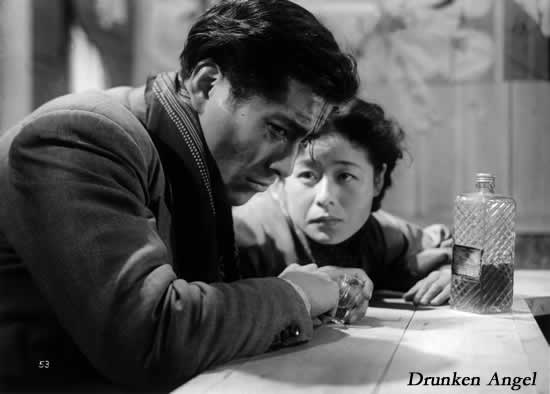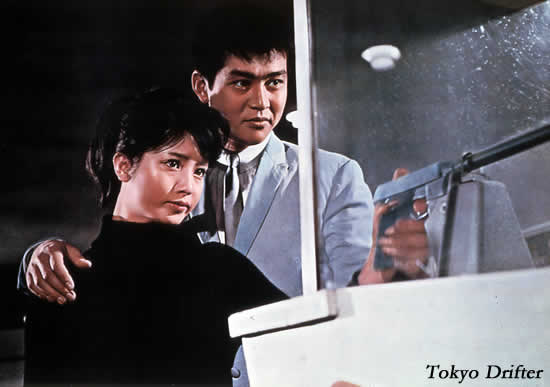 In conjunction with the exhibition Japan’s Modern Divide: The Photographs of Hiroshi Hamaya and Kansuke Yamamoto, the Getty presents a film series reflecting the Shōwa Era (1926–89) of Japan. The films chosen feature the magnificent city of Tokyo, a metropolis that before the war was in transition, and after became a city that rebuilt itself like no other in modern history. This film series is intended for teen and adult audiences.
In conjunction with the exhibition Japan’s Modern Divide: The Photographs of Hiroshi Hamaya and Kansuke Yamamoto, the Getty presents a film series reflecting the Shōwa Era (1926–89) of Japan. The films chosen feature the magnificent city of Tokyo, a metropolis that before the war was in transition, and after became a city that rebuilt itself like no other in modern history. This film series is intended for teen and adult audiences.
Featuring directors Akira Kurosawa, Yasujiro Ozu, Hiroshi Shimzu, and other noted filmmakers, the series surveys Tokyo’s diverse inhabitants, including sharp-dressed yakuza, the elderly and their grown children, and prostitutes in brothels. Class struggle and the aftermath
of World War II are just a few of the subjects featured in the films.
FILM SERIES: IN TOKYO
Location: Harold M. Williams Auditorium
Admission: Free; reservations required, limit 4 seats per person.
Call (310) 440-7300 or visit www.getty.edu.
SATURDAY APRIL 20
Mr. Thank You
Saturday, April 20, 2013, 4:00 p.m.
Directed by Hiroshi Shimizu
(1936, 78 minutes, DVD)
This film is set almost entirely on a bus ride from the rural countryside to the outskirts of Tokyo. Although not well known in the United States, Shimizu has often been called Japan’s Jean Renoir.
Drunken Angel
Saturday, April 20, 2013, 7:00 p.m.
Directed by Akira Kurosawa
(1948, 102 minutes, 35mm)
The young Akira Kurosawa’s early film takes place in war-weary, heat-soaked, and tuberculosis-striken Tokyo. Featuring the debut of the dashing Toshiro Mifune in a Japanese gangster noir.
SUNDAY APRIL 21
Tokyo Story
Sunday, April 21, 2013, 3:00 p.m.
Directed by Yasujiro Ozu
(1953, 136 minutes, 35mm)
On many top-10 film lists, this story is deceptively spartan: an elderly couple from a rural town travel to Tokyo to see their grown children. A simple, unsentimental tale that is universal in scope.
SATURDAY APRIL 27
Tokyo Drifter
Saturday, April 27, 2013, 4:00 p.m.
Directed by Seijun Suzuki
(1966, 89 minutes, 35mm)
Swinging 60s in Tokyo: men don fitted suits with skinny ties, and women sport black turtlenecks. Director Seijin Suzuki created the modern yakuza (mafia) film. This is one of his best.
\Co-presented by the Japan Foundation, Los Angeles
Street of Shame
Saturday, April 27, 2013, 7:00 p.m.
Directed by Kenji Mizoguchi
(1956, 87 minutes, 35mm)
Considered one of the greatest of Japanese directors, Kenji Mizoguchi was mostly concerned with the difficult plight of women in Japan. In this, his last film, Mizoguchi tells the stories of five prostitutes working in
Dreamland, a Tokyo brothel.
SUNDAY APRIL 28
She and He
Sunday, April 28, 2013, 3:00 p.m.
Directed by Susumu Hani
(1963, 110 minutes, 35mm)
Director Susumu Hani was a central figure in the Japanese New Wave of the late 50s and early 60s. “She”is a young, modern woman living in a new apartment complex. “He,” a slum living just next door, is the man
to whom she is drawn. Hani presents a biting review of postwar class consciousness and rigid social hierarchy.
Co-presented by the Japan Foundation, Los Angeles.
Additional information is available at www.getty.edu.
